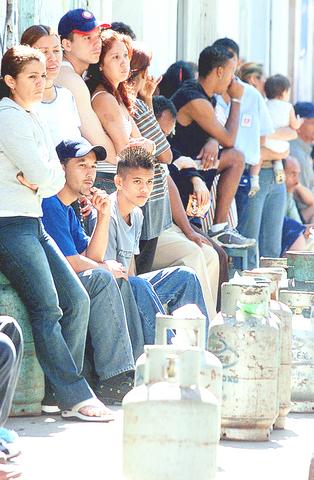Venezuela said it would fix the bolivar's exchange rate and extend a ban on trading to bolster foreign reserves drained by government efforts to defend the currency during a two-month-old nationwide strike.
The measures were announced by Finance Minister Tobias Nobrega on the country's Televen television network. He didn't specify at what rate the bolivar will be fixed.

PHOTO: REUTERS
Venezuela, the No. 4 exporter of oil to the US, needs to stem an exodus of foreign cash that has resulted in a 14 percent plunge in foreign reserves since the strike began. The stoppage, aimed at ousting President Hugo Chavez, is in its 57th day. Blocking access to foreign currency will make it harder to move money overseas and promote an underground economy.
"They have to do something to keep their reserves but a fixed exchange rate isn't the best solution," said Sandra Ebner, who helps manage 4 billion euros (US$4.3 billion) of emerging market debt for Deka Kapitalanlagegesellschaft in Frankfurt. "It's going to cause a run on the currency and they will have to give up the fixed rate."
The central bank spent as much as US$70 million a day earlier this month to bolster the currency, raising concern of a default on US$22.4 billion of foreign debt. The nation's international reserves declined to US$13.6 billion Friday. About US$35 billion left the country since Chavez was elected in February 1999, the president said recently.

A magnitude 7.0 earthquake struck off Yilan at 11:05pm yesterday, the Central Weather Administration (CWA) said. The epicenter was located at sea, about 32.3km east of Yilan County Hall, at a depth of 72.8km, CWA data showed There were no immediate reports of damage. The intensity of the quake, which gauges the actual effect of a seismic event, measured 4 in Yilan County area on Taiwan’s seven-tier intensity scale, the data showed. It measured 4 in other parts of eastern, northern and central Taiwan as well as Tainan, and 3 in Kaohsiung and Pingtung County, and 2 in Lienchiang and Penghu counties and 1

FOREIGN INTERFERENCE: Beijing would likely intensify public opinion warfare in next year’s local elections to prevent Lai from getting re-elected, the ‘Yomiuri Shimbun’ said Internal documents from a Chinese artificial intelligence (AI) company indicated that China has been using the technology to intervene in foreign elections, including propaganda targeting Taiwan’s local elections next year and presidential elections in 2028, a Japanese newspaper reported yesterday. The Institute of National Security of Vanderbilt University obtained nearly 400 pages of documents from GoLaxy, a company with ties to the Chinese government, and found evidence that it had apparently deployed sophisticated, AI-driven propaganda campaigns in Hong Kong and Taiwan to shape public opinion, the Yomiuri Shimbun reported. GoLaxy provides insights, situation analysis and public opinion-shaping technology by conducting network surveillance

Taiwan is gearing up to celebrate the New Year at events across the country, headlined by the annual countdown and Taipei 101 fireworks display at midnight. Many of the events are to be livesteamed online. See below for lineups and links: Taipei Taipei’s New Year’s Party 2026 is to begin at 7pm and run until 1am, with the theme “Sailing to the Future.” South Korean girl group KARA is headlining the concert at Taipei City Hall Plaza, with additional performances by Amber An (安心亞), Nick Chou (周湯豪), hip-hop trio Nine One One (玖壹壹), Bii (畢書盡), girl group Genblue (幻藍小熊) and more. The festivities are to

AFTERMATH: The Taipei City Government said it received 39 minor incident reports including gas leaks, water leaks and outages, and a damaged traffic signal A magnitude 7.0 earthquake struck off Taiwan’s northeastern coast late on Saturday, producing only two major aftershocks as of yesterday noon, the Central Weather Administration (CWA) said. The limited aftershocks contrast with last year’s major earthquake in Hualien County, as Saturday’s earthquake occurred at a greater depth in a subduction zone. Saturday’s earthquake struck at 11:05pm, with its hypocenter about 32.3km east of Yilan County Hall, at a depth of 72.8km. Shaking was felt in 17 administrative regions north of Tainan and in eastern Taiwan, reaching intensity level 4 on Taiwan’s seven-tier seismic scale, the CWA said. In Hualien, the